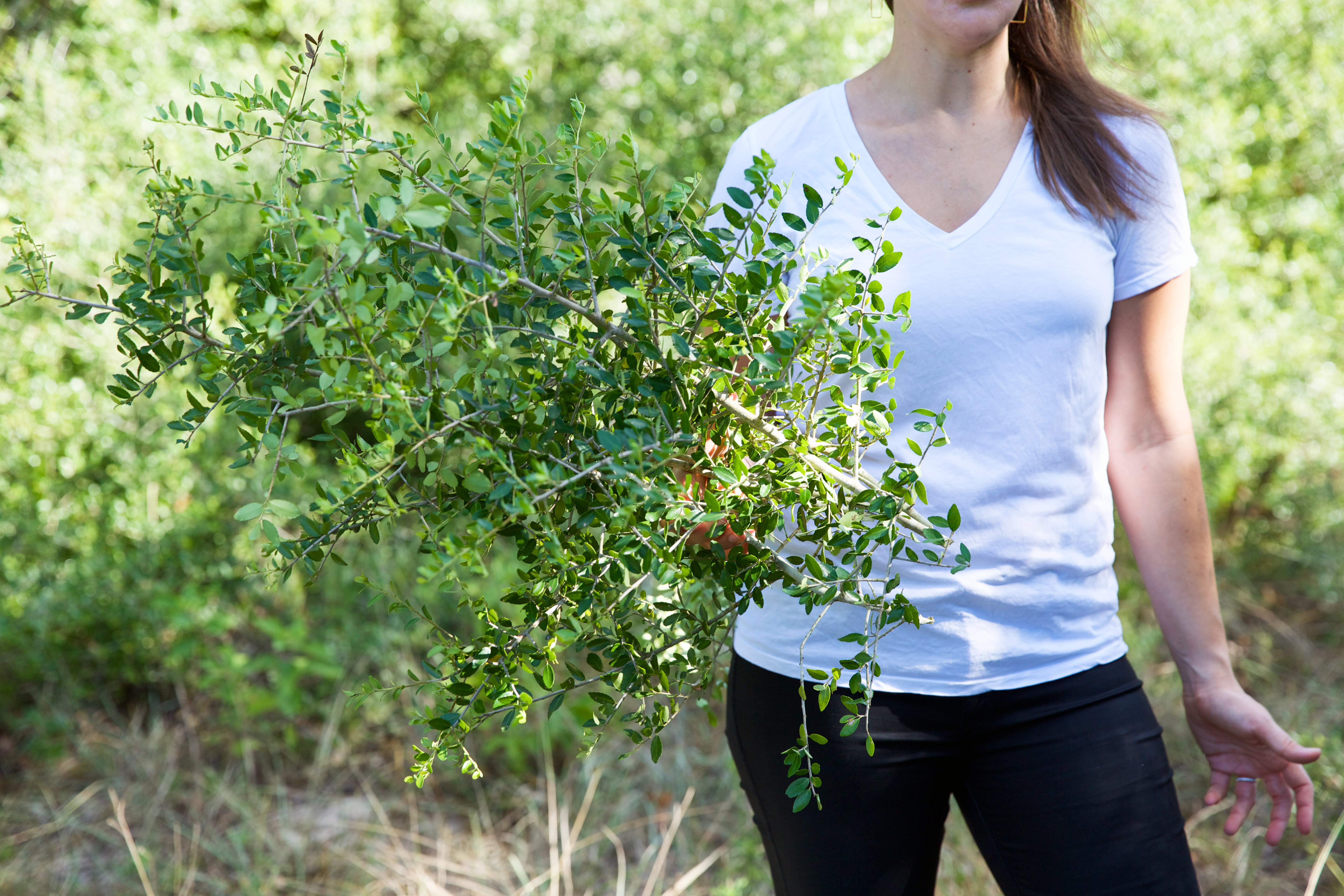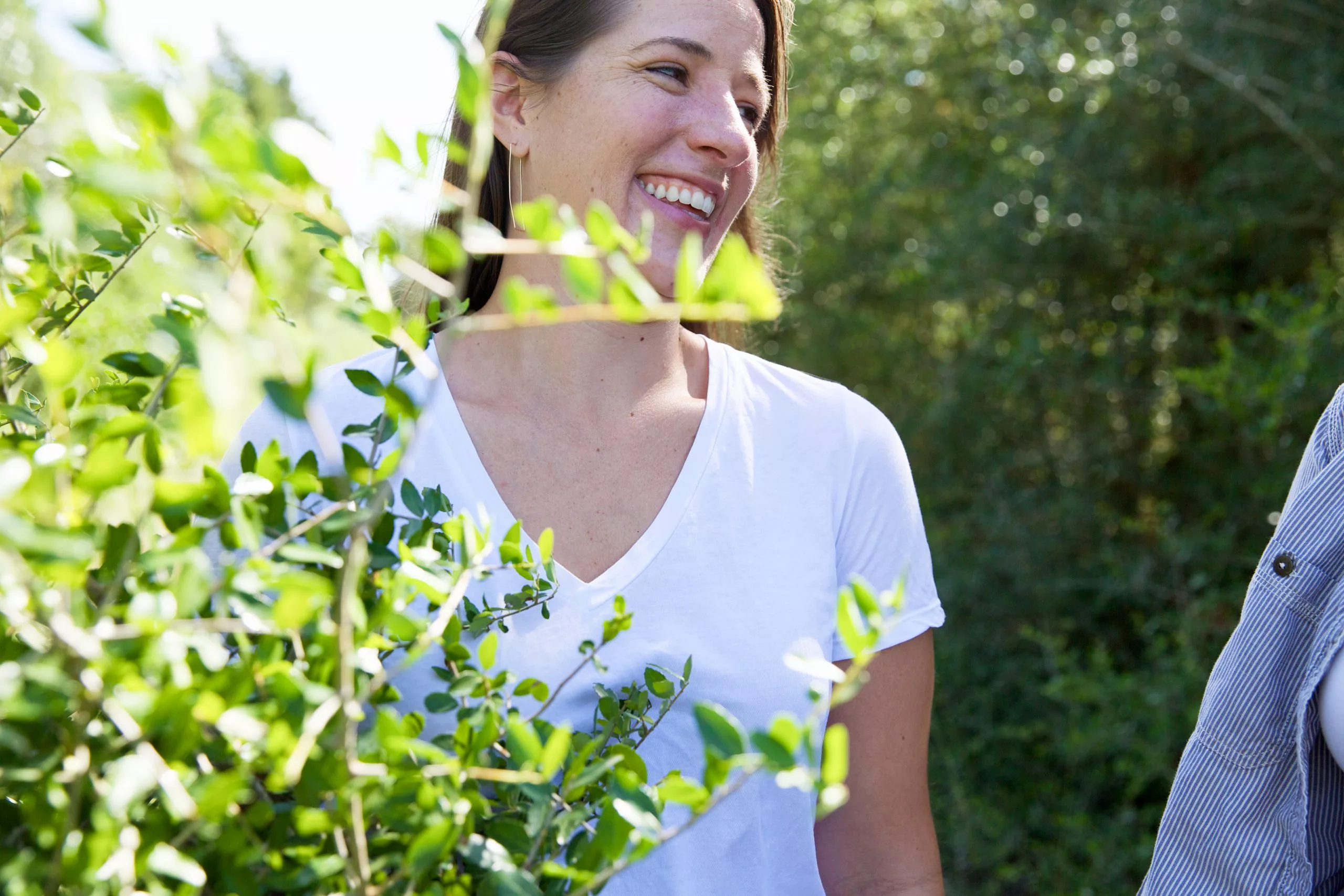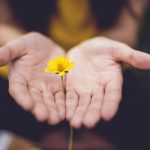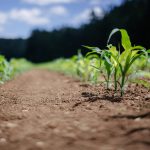For centuries, Native Americans and early traders revered the healing and energizing properties of the yaupon holly. To this day, it remains the only indigenous caffeinated plant in North America. Haven’t heard of it? That’s not surprising. As the popularity of yaupon grew and export to Europe increased during the seventeenth century, some say the East Indian Trading Company (which made its money on tea) spread rumors to tarnish the appeal of yaupon, comparing it to a “poor man’s” tea or coffee. The smear campaign was effective: for centuries, yaupon all but vanished. Today, thanks to a fast-growing Texas social enterprise, it’s making a comeback.
In less than four years, CatSpring Yaupon has taken their yaupon preparations from farmers markets in Texas to a keynote at the World Tea Expo, and the sleepy town of Cat Spring, TX, is leaving its mark on the world tea stage — in more ways than one. We sat down with co-founder Abianne Miller Falla — one of the recipients of a 2017 EILEEN FISHER Women-Owned Business Grant — to learn more about how she’s transforming the South’s most stubborn weed into the hottest old-but-new wellness drink, and to find out what makes her approach to business unique.
What’s your origin story?
Abianne Miller Falla: I like to say that I didn’t find yaupon, yaupon found us, because that’s exactly what happened. About six years ago, there was a massive drought in Texas. Statewide, we lost over 20 million trees. Our family property in Cat Spring didn’t escape unscathed: we lost everything from our hay to our 100-year-old oaks. It was alarming: the whole landscape looked like wilted spinach, but not the yaupon. It was fine. My sister and cofounder, JennaDee Detro, started to do some research. At first, she thought that maybe the plant might be good for furniture. Instead, she discovered the forgotten legacy of yaupon. It had been trading across the continent for centuries — and even by boat to Europe. Studies were also coming out of Texas A&M and University of Florida demonstrating its caffeine content, high levels of antioxidants (comparable to blueberries), and chemo-preventative properties. We were hooked.

The yaupon plant is North America’s native cousin to yerba mate.
Why do you think yaupon offers such an untapped potential?
AMF: We’re only now rediscovering what indigenous tribes had been onto for centuries. I think yaupon has been overlooked for various reasons. First, we’ve been busy with big agriculture in the US, as opposed to smaller, sustainable farming. We’ve also been distracted by the opportunities of import. And we’ve blindly continued the colonial legacy of seeing yaupon as a “poor man’s drink.: The Spanish recognized the significance of yaupon when they arrived in America. Native Americans had consumed and traded it for generations. However, when the English arrived, they didn’t want anything to disrupt the power of the tea trade — and their monopoly on it — so they downplayed the native yaupon.
To date, we’ve experimented with traditional preparation methods for Japanese tea and yerba mate (a cousin plan of yaupon) in order to produce leaves suitable for steeping. We started out producing small batches and selling it to restaurants, and to the general public through farmers markets. People were excited, and demand has kept growing. We didn’t discover the plant, nor did we invent the benefits of yaupon. We like to say we’re stewards of this opportunity. We’re committed to bringing yaupon back to market in the most respectful way — respectful of our community, mindful of sustainability (in our harvesting methods), and reverential of its indigenous legacy.
We often celebrate our successes in business, and forget to shine the spotlight on the most challenging moments. Can you share a story about a hard moment for you in building this business? What kept you going, and propelled you to where you are now?
AMF: There are many to choose from. I think one of the biggest challenges of growing an agricultural and manufacturing company like ours is the fact that growth is tiered. When one process changes, most of the other processes have to change at the same time. I’m often upgrading several aspects of the company at an inflection point. One of my biggest mistakes to date has been not hiring to meet the demands of the next stage, or not being clear about which projects I needed to hand off to other people on the team. Oftentimes, I’ve shouldered more of the burden than necessary, and the new hire has spun her wheels because she wasn’t set up for success.
The success of individuals on your team will make or break your team. I’ve learned it’s important to empower them, and to release everyone to run their race or play their part. No matter what you’re great at, it’s important to know what you’re great at, figure out what you can learn, and surround yourself with talented people who can do the rest. That said, I’ve also had to learn which things are worth learning so that I can do them myself, even if it’s only to do them the first time. Actually rolling your sleeves up and doing the work empowers leaders to know how to hire for the role.
As an entrepreneur, I wear many hats, and I’m called to solve diverse problems. I can’t do it all alone. Thankfully, I’ve managed to surround myself with brilliant, creative people, who allow me to ask endless questions and seek their advice and experience. Surrounding myself with champions and creative people has given me the boost to keep going when times get hard. They’re often the ones asking tough questions to help me make sure I’m propelling in the right direction.
There’s a lot of talk nowadays about how adding purpose can make good brands great. CatSpring has taken a more holistic, organic approach to building purpose into the brand from the start. How did that come about, and why does it continue to be a trademark of the CatSpring approach to business?
AMF: Our mom raised us to believe that success is when everyone in our community benefits. Since my cofounder and I are sisters, we started this company with that belief deeply entrenched in everything we do. At the end of the day, we’ve also learned that sustainability is about more than just the land. It’s about people, too.
Sustainability is about more than just the land. It’s about people, too.
That’s one of the reasons we created our People First employment initiative to provide dignified employment opportunities in our underserved communities. We’re committed to equitable hiring practices that benefit individuals who might have had a brush with the criminal justice system (for example, through exiting trafficking). Much like yaupon, these individuals in our community have been overlooked, undervalued, and sometimes even written off as a nuisance. They’re disregarded by society. Shifting the needle in a more productive direction — one than values human beings — is important to us, because we understand that the impact we have on our community matters. We can’t take on reform at the national level. However, we can lead by example right here at home. True change begins with each and every one of us, not just with sweeping legislative reform. We hope to inspire other entrepreneurs to do the same, and lead by example. It makes sense. And honestly, I don’t know another way to build a business!
Can you tell us a little about your People First program and explain how such an approach might serve as a model to other entrepreneurs committed to making a difference in their community? What advice can you offer to bolster their success?
AMF: We know the criminal justice system is broken, and our aim is to take a stand against the inequities that this system creates. We work directly with probation officers in our rural community to identify individuals who want their future to look different than their past, and hire them as our harvesters. In our packaging facility, we work with women who have a history of generational poverty. While we single-handedly will not hire thousands of people, the ripple effect of the lives changed by their time with us at CatSpring Yaupon is affirming and inspiring. It affects not only the individual, but also their family — and the entire community.
I want to encourage other companies that are interested in making this kind of difference to give us a call. We’re happy to share our best practices, and even mistakes. But seriously, it’s not rocket science. At the core, I’d say: hire people with an understanding of where they are. We’ve found that one of the hallmarks of generational poverty is living from crisis to crisis. With that in mind, we created flexible employment shifts so that the next crisis doesn’t have to mark the end of employment with us. We dialog with our staff to know what they need and to listen to what makes their being present at work easier. We’re also quick to admit when we make mistakes. I’m truly humbled by how forgiving our employees have been on our steep learning curve, and inspired by how supportive of each other they are. We didn’t create the supportive community at our facilities. They did. One-hundred percent.

CatSpring yaupon tea
Can you share your favorite hard-learned tips for other female entrepreneurs, and tell us a little background on how you learned these lessons?
AMF: Know your story. Spend time seeking to understand who you are and what’s important to you. Have conversations with your co-founders and customers about your brand story. Since JennaDee and I are sisters, we started the company with a lot of things being understood between us. It wasn’t until we had to articulate some of our brand that we realized how much went unsaid. We also had to share our story with different audiences. What were the follow up questions? Where did people want to know more? Where were people seemingly confused? It’s the most important part of your brand so it’s worth honing.
Narrow the region of darkness and then move confidently forward within. I learned this in theory at Acton (an alternative MBA in Entrepreneurship in Austin, TX), but it’s not until building CatSpring that I realized how true the principle is. We often approach education and life as if there’s one correct answer. If I’ve learned one thing as a founder and CEO, it’s that there’s never a single, correct response. Get creative: there are so many ways to build a company. There are as many paths to funding, customers, sales channels, and options for sourcing that you’re willing to entertain — and chances are, innovative approaches will prove successful in the long term. Throughout your decision-making process, gather all of the information you can to “”narrow the region of darkness.”” If you ask enough questions, you’ll reduce the range of choices — and feel confident making a decision.
How can we better prepare social entrepreneurs ? Can you tell us a little about some of the experiences that prepared you?
AMF: Honestly, most of my preparation came from my mom. She made a lot of brave choices while we growing up so that someone’s poor choices didn’t limit our opportunities. I know that’s why JennaDee and I were so sure we needed to take a stand for others in our community. We had such a fierce advocate as an example, and we wanted to be the same for others.
Professionally, I was impacted by my time in community development at lululemon in DC. lululemon taught me that success isn’t an or – it’s an and. That principle sounds so simple in hindsight, but it was different to any other approach I’d encountered. So often, the pressure entrepreneurs feel to hustle equates to “either I succeed or you succeed.” At lululemon, I learned to redefine potential competitors as potential partners. We’re not a threat to each other. Instead, we can be teammates. I can be your champion and flourish. To this day, I thrive in large part because of collaborations. There’s an old saying that embodies this: If you want to go fast, go alone. If you want to go far, go together.
Through the process of building this company, you’ve emerged as a leader in the workforce, and also in the surrounding community. What makes a great leader? Can you tell us a little about the leaders to whom you’ve looked to be inspired? How are you challenging yourself to keep learning and get better?
AMF: I’ve been incredibly fortunate to have some amazing examples of strong, conscious leaders in my life and have a team of mentors that have generously given time to invest in me. I think more than anything, learning to take feedback, and seek out valuable criticism, is the hallmark of a great leader. You can’t know everything, and no one expects you to. Unless you’re building people and processes into your life to point out your blind spots, you’ll never see them — they’re called blind spots for a reason!
Surrounding myself with people who will ask the tough questions is something I’ve had to learn to do better and anew at every stage in CatSpring. Each stage of growth has presented new challenges demanding different skill-sets, so I’ve had to learn the skills myself or bring experts alongside.
In essence, I’d say that a great leader must have vision, and remain highly collaborative so that she (or he) never becomes slave to the vision. While clear direction is a must for forging ahead, it’s also important to remain flexible when it comes to the destination. In many ways, it’s like driving in the dark. You need your headlights, you you need to know where the road is (and stay on it), but you can’t worry about the part of the road you can’t see yet. Eventually, it will come into focus (and you can even make a turn if you need to, to correct your course).
What’s next for CatSpring Yaupon?
AMF: We’re always looking for ways to celebrate and collaborate with other leaders, creatives, and sheros in our community. I’m excited that we have a couple partnerships in the pipeline and will be finding new ways to highlight some of the inspiring folks we’ve had the pleasure of learning from. I know that if they have personally impacted me in such great ways, their stories should be shared so that more folks are challenged by them. All that to say, you can expect to see more yaupon on shelves and in the businesses you love, and you can also expect to see us celebrating more of the community of female entrepreneurs and mentors we believe can provide a valuable model for others. What can I say? It’s the CatSpring way — and we want to share it with the world.
This article is part of a series featuring the 2017 winners of the EILEEN FISHER Woman-Owned Business Grant Program. Instilling confidence in women business owners is one of Eileen Fisher‘s personal passions, and since 2004 the grant program has supported innovative, women-owned companies that are beyond the start-up phase and ready to expand their business and their potential for positive social and environmental impact.





